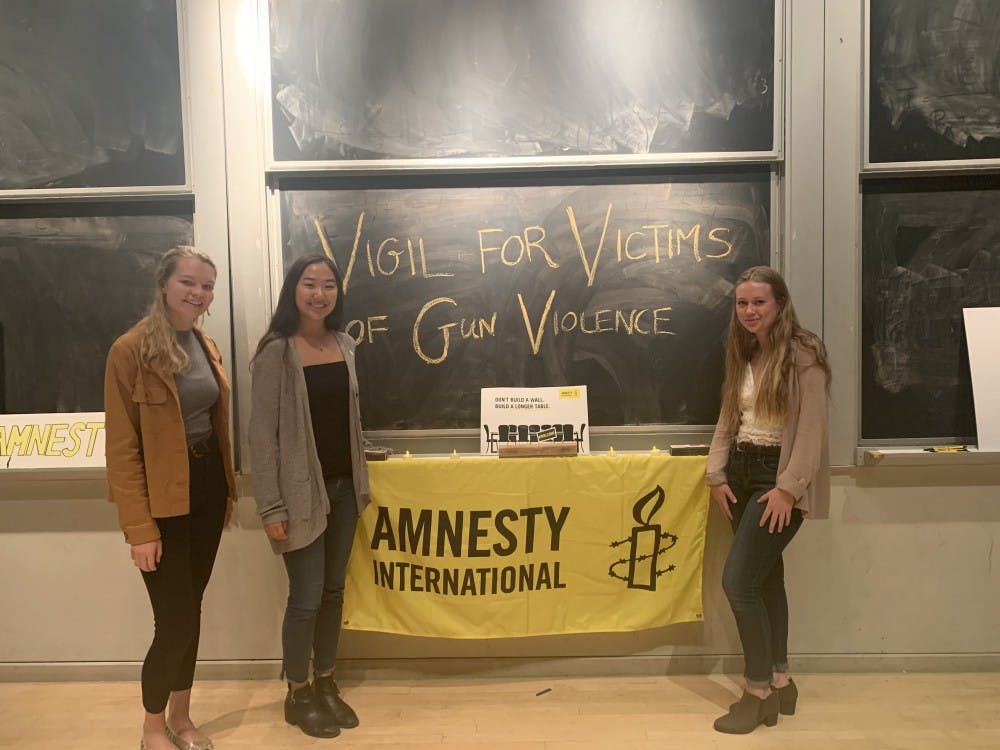Daniel Webster, professor of Health Policy and Management at the Bloomberg School of Public Health, spoke on Tuesday about American gun violence at the Vigil for Victims of Gun Violence. The vigil was organized by JHU Amnesty International and held in the Bloomberg Center.
Amnesty International, the student group’s parent organization, is a British non-governmental organization that promotes the advancement of global human rights.
This year, JHU Amnesty International has announced that it will focus on gun violence and the global refugee crisis. Junior Janet Hong, the group’s co-president, explained why she thought the group decided to highlight gun violence and how that led to the vigil.
“Especially with the recent shootings in El Paso, there’s been a lot of talk about this topic,” she said. “We wanted to do something to not just raise awareness but also commemorate those who have been impacted by gun violence.”
Webster began his speech by explaining how he began studying gun violence in America.
He said that living in Baltimore had played an unfortunate role in that particular career choice.
”I did not come here to study gun violence but it just so happened that at that time, Baltimore and many cities across the United States were experiencing what one could only describe as an epidemic of gun violence,” he said.
In 1992, the year Webster joined the School of Public Health faculty, the Baltimore Police Department reported 333 homicides for that year, most of which involved firearms. For 2018, there were 309 reported homicides, more than 80 percent of which were gun-involved.
As Webster outlined the political and historical context for gun violence in America, he argued that the rate of gun violence in the U.S. is unique among its peers.
“We have very high rates of gun violence in the United States. If you would compare the United States to other Western democracies, our homicide rate is seven times higher than the average of all those other Western democracy, high-income countries,” Webster said.
There are around 40,000 gun deaths a year in the United States, he explained. What most do not acknowledge, he argued, was that nearly 60 percent of those deaths are suicides.
For Webster, mass shootings are just one symptom of a systematic problem in the U.S. and one that gets far more media coverage than others.
“For many people who are privileged, when we think of gun violence, we think of mass shootings... that represent less than two percent of gun-related homicides,” he said. “And yet, most of our policy revolves around mass shootings.”
Webster argued that there were two primary policy areas that influence the frequency of mass shootings. The first is how difficult it is to acquire a firearms license, and the second is the maximum legal magazine capacity.
Webster stated the rigor of firearms licensing regimes matter a lot. A more rigorous licensing regime, he said, could drive a nearly 50 percent reduction in the frequency of mass shootings.
Webster also acknowledged the role that grassroots organizations play in the prevention of gun violence. He specifically mentioned Safe Streets Baltimore, a local public health campaign that helps formerly gun violence-involved community members go back into their neighborhoods and curb gun violence.
At the end of his speech, Webster and the Amnesty International organizers held a candlelit vigil to honor the victims of gun violence and others who have been affected by it.
Sophomore Kylie Poe said that she hoped that more people would have come to the vigil. Events like these, she said, are important sites for creating the conditions for change.
“It will take a lot of these little presentations and people making the conscious decision to get involved for things to improve,” she said.
Sophomore Madi White, JHU Amnesty International vice president, pointed towards the importance of examining one’s perspective and acknowledging those that have been less fortunate.
“It’s important to take time out of our lives and take time to think about those who have not been as lucky as us and who have been victims of violence and take a moment for them,” she said.
Hong echoed both of these statements, discussing her belief that it is crucial to remember how gun violence affects both the nation and local communities.
“Sometimes we forget about how gun violence impacts Baltimore’s community. Sometimes we get accustomed to it and it gets overlooked. It’s important that we keep reminding ourselves that it’s not just these once-in-a-while mass shootings but it’s impacting people, our neighbors and people in our community every day,“ Hong said.





